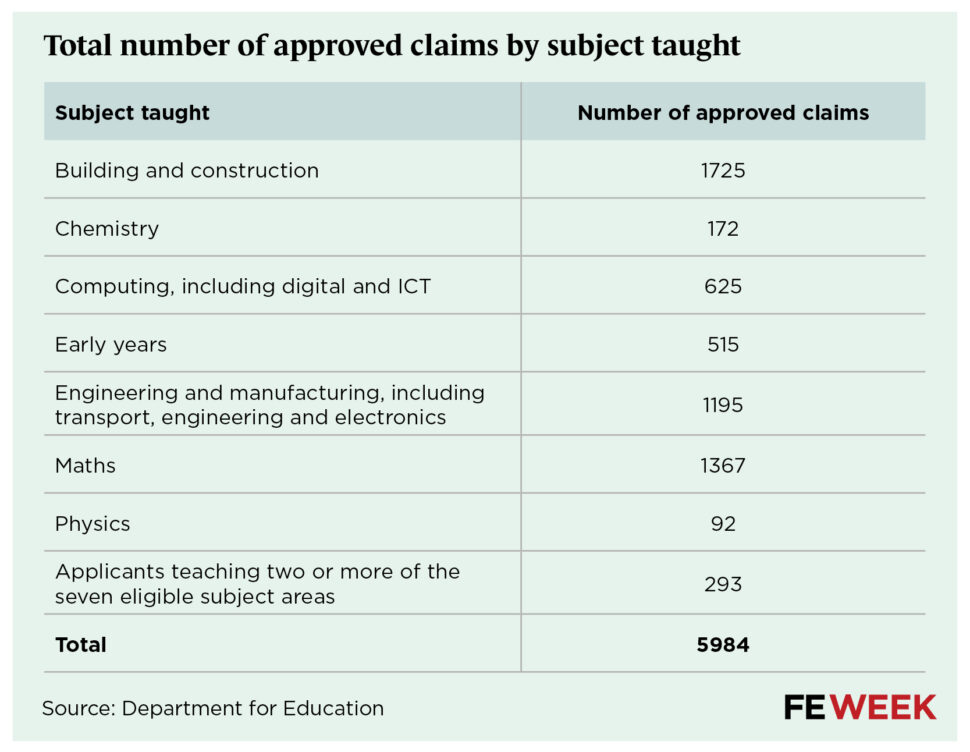Nearly 6,000 FE teachers have been paid a chunky government bonus – worth a combined £34.1 million – designed to stop them quitting their jobs.
Introduced by the previous Conservative government, the ‘targeted retention scheme incentive for FE teachers’ offered up to £6,000 tax-free cash for teachers of subjects where there are “critical skills priorities” and high teacher vacancy rates.
Controversially, the scheme excluded teachers working for independent training providers.
Data published today revealed the take-up and payment amounts for the first year of the retention scheme.
There were 7,790 applications in total, although just over one in five were rejected for being ineligible. Applications closed on March 31 but 76 were still awaiting a decision, meaning 5,984 were successful.
There were seven subject areas chosen for the scheme in 2024-25; building and construction, chemistry, computing and digital, early years, engineering and manufacturing, maths and physics.
Most payments, 29 per cent, went to building and construction teachers, followed by maths (23 per cent) then engineering and manufacturing (20 per cent).
But the amount each teacher received differed depending on the proportion of disadvantaged 16 to 19 year olds studying at their college, and their weekly teaching hours.
To get the maximum £6,000 payment, an eligible teacher would need to teach for at least 12 hours per week at a college where 50 per cent or more 16 to 19 year olds were disadvantaged.
The vast majority, 91 per cent, of payments went to teachers in further education colleges. Just 5 per cent went to teachers in schools and academies, and 4 per cent went to sixth form colleges.
This week’s figures show the average amount claimed was £5,700, suggesting over just over £34 million was paid out in total.
It’s too early to estimate how many of the 5,984 would have left had it not been for the incentive payments, but a 2023 Institute for Fiscal Studies report found FE teachers were much more likely to quit than other public sector professions.
The figures come as the Association of Colleges and National Joint Forum of trade unions meet to negotiate the 2025-26 pay award recommendations for FE workers, and follows a £50 million injection for staff pay this academic year, which will be paid to colleges next month based on 16-19 student numbers.
Jo Grady, general secretary of the University and Colleges Union (UCU), said the incentive scheme neglects “critical subjects” and the growing pay gap between school and college teachers.
“Many teachers across further education continue to struggle to make ends meet because of such low pay, therefore a meaningful increase is vital,” she added.
“This incentive is not enough to close the pay gap between school and college teachers and will result in educators delivering critical subjects like English, social work and nursing receiving no uplift whatsoever.”
The Department for Education confirmed to FE Week that another round of applications will open this autumn but would not confirm whether eligibility criteria would change.
Jerry White, principal and chief executive of City College Norwich and chair of the Association of Colleges workforce strategy group, said the scheme is “good” for recipients but doesn’t solve systemic FE pay issues.
“Additional funding for the FE workforce is welcome. Clearly thousands of colleagues have been able to claim that money and that’s no doubt been good for them,” he told FE Week.
“Ultimately, these initiatives are helpful but they are a sticking plaster. What would make a bigger difference would be if I could go out with jobs with that extra five grand on the salary for everyone, but we can’t because the funding isn’t good enough.”
Negotiations between sector employers and staff unions have become more complicated following reports the School Teachers’ Pay Review Body has recommended a pay rise of “close to 4 per cent”, higher than the 2.8 per cent previously floated by ministers. A pay recommendation for colleges would need to be higher than the award offered to schools to stop the pay gap growing further.
Colleges and providers will see a 3.78 per cent funding increase to their 16-19 base funding rate for 2025-26, but they are also facing an “unprecedented” demographic boom with DfE-imposed limits on how much growth it will fund.
Grady added: “The government must come back with the funding to properly boost pay across the board to ensure our members are paid the same as schoolteachers, to help end the recruitment crisis and allow colleges to support students to reach their full potential.”

















Targeted retention payments that are not applicable to staff with greater than 5 years experience. It seems the government have not quite considered the impact this may have on experienced FE teachers whom will receive no additional award (alongside the rest of the poor metrics FE staff are subjected to, such as the growing pay gap between FE and schools).
This policy seems to be a carbon copy of what has been applied to schools. It may have made sense for someone with greater than 5 years experience in a school to not receive the additional award, because they’ve climbed the salary spine and are being fairly remunerated for their work. However, in FE this £6k payment makes up almost 100% of the pay gap between a new starter and someone with 20years+ experience, therefore someone just starting out their teaching career (possibly not even qualified to teach) will be earning more than someone with 20 years experience.
This is the position I find myself in, where I fully support my newer colleagues receiving additional pay, however feel as though my experience, knowledge and commitment to FE (10years) is going unrecognised. It’s driving me and some of my other experienced colleagues to reconsider our position and explore alternatives both inside and outside of the education sector.
I teach GCSE maths. It’s a shame to see a policy that will actively drive out experience from a sector that has struggled to attract and maintain high quality talent, when it’s core objective was to do exactly the opposite.